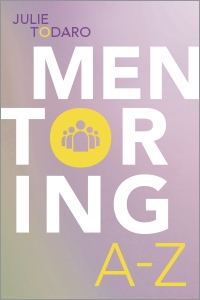
Primary tabs
You don't need to be an ALA Member to purchase from the ALA Store, but you'll be asked to create an online account/profile during the checkout to proceed. This Web Account is for both Members and non-Members.
If you are Tax-Exempt, please verify that your account is currently set up as exempt before placing your order, as our new fulfillment center will need current documentation. Learn how to verify here.
- Description
- Table of Contents
- About the author
- Reviews
Your library's future is as good as the talent you develop. Too many mentorship programs are cursory; without structure and expectations, they accomplish little beyond a procedural orientation. But a solid, sustainable mentorship program can be a game changer for libraries, with long-term results that include career development, organization-wide professionalism, and retention. Here, library leader Todaro offers an accessible guide to putting mentorship into practice, complete with scanning checklists and critical questions that will assist you in designing, planning, and implementing your own program. Bypassing abstract management theories in favor of succinct action items, this book includes
- Four case-method scenarios that will prepare you for making decisions in common mentoring situations
- A discussion of mentor, mentee, reverse-mentoring, and co-mentoring terminology, and how to choose the best language to shape the expectations of your program
- Tips on how to apply nine measurements you probably already use for evaluation, plus five new ones that will make your program even more effective
- Suggested content and events in a mentorship curriculum, with sample goals, job descriptions, and advice on program planning
- Ways to address objections to a mentorship program
Administrators at all types of institutions will benefit from Todaro's sensible, to-the-point insights into creating and sustaining a mentorship program.
Preface
Acknowledgments
Introduction
Chapter 1: What's in a Name?
Chapter 2: The Breadth of Twenty-First-Century Mentoring
Chapter 3: The Value and Benefits of Mentoring
Chapter 4: Designing and Implementing In-Person, Virtual/Digital, and Hybrid Mentorship Programs and Processes
Chapter 5: Mentorship Education and Training
Chapter 6: Mentor and Mentee Issues
Chapter 7: Best Practices for Mentorship Program Measurement and Evaluation
Appendixes
A: Program Planning
B: Job Descriptions
C: Goals/Outcomes
D: Checklists
E: Correspondence
F: Application Forms
G: Recommendation Forms
H: Evaluation Content
Bibliography and Resources
Index
Julie Todaro
Julie Todaro is the dean of library services at Austin Community College in Austin, Texas. She is also a management consultant and frequent workshop presenter. Her research and publications are focused on the 21st-century management of nonprofit environments and include best practices in human resources, customer service, and emergency preparedness. She is the 2016–2017 president-elect of the American Library Association.
"The reader will find clear guidelines for mentors and people considering being mentors to consider."
— ARBA
"The title says it all! In slightly over one hundred fifty pages, Mentoring A-Z presents readers with a comprehensive discussion of mentoring in the twenty-first century … Practicing library professionals in all areas of librarianship and institutions with library and information science programs should consider this book for their collections."
— Catholic Library World
"A concise primer ... Todaro takes great pains in outlining the different mentoring programs within ALA (division and roundtable level), professional organizations, state organizations, other higher level education institutions, and even blogs and websites devoted to mentoring and leadership."
— Against The Grain
"Packed with an enormous amount of current information on mentoring and the creation of mentoring programs in library settings ... I highly recommend this book to librarians who are interested in developing a mentoring program within their organization or libraries that collect in the area of library management."
— Technical Services Quarterly


